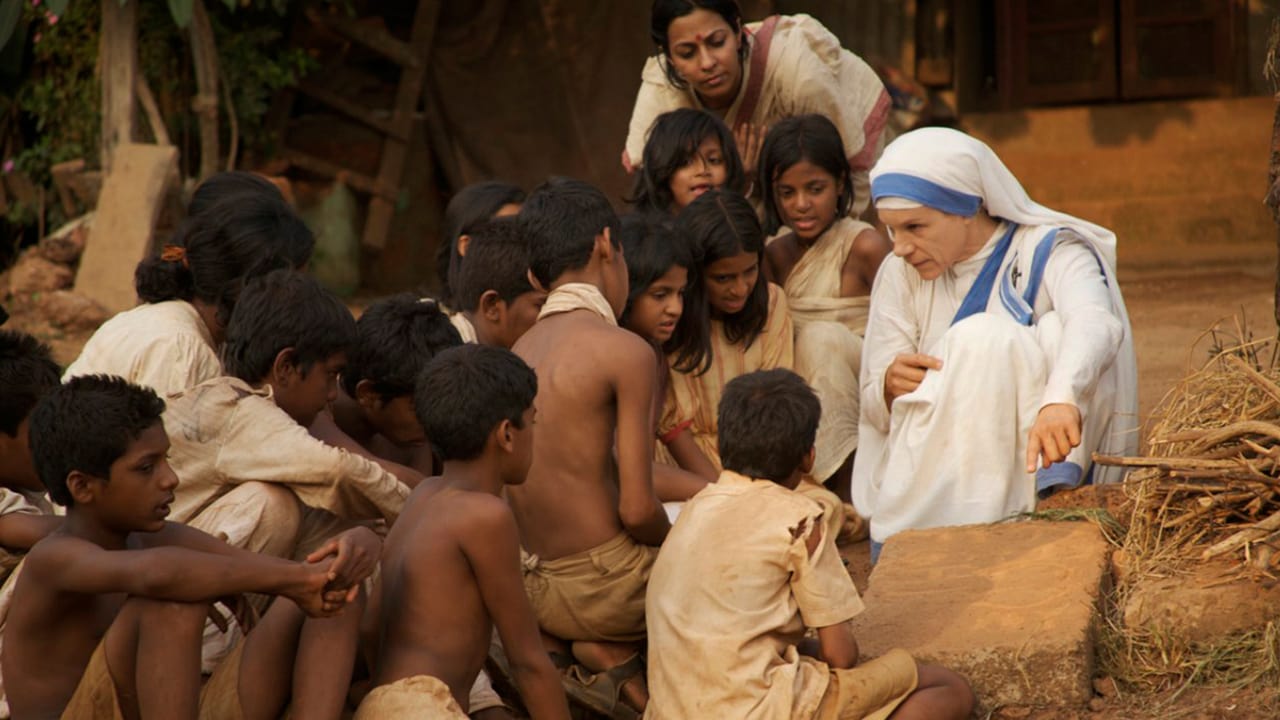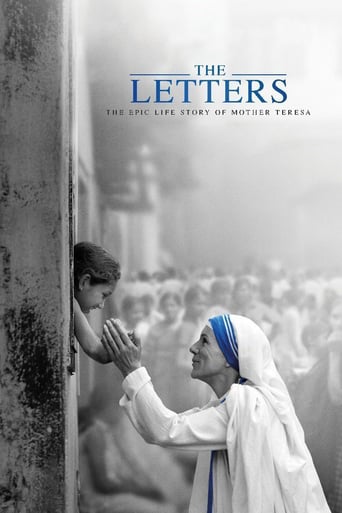

Very disappointed :(
... View MoreExcellent, a Must See
... View MoreCrappy film
... View MoreOne of the film's great tricks is that, for a time, you think it will go down a rabbit hole of unrealistic glorification.
... View MoreThe Letters is a biographical film about Saint Mother Teresa of Calcutta based on the letters of 50-year correspondence with her longtime friend and spiritual adviser,Father Celeste van Exem. It stars Juliet Stevenson as Mother Theresa together with Max von Sydow, Rutger Hauer and Priya Darshini.The story starts when Mother Teresa is honored to be a recipient of the Nobel Peace Prize for being one of the greatest humanitarians of our time.Millions are touched due to her selfless commitment that have changed their hearts and inspired them to be the extension of Christ's work particularly charity and helping the poor.Then a story is told from the point-of-view of Fr.Celeste who recounts her life from her work,how she started her own charity cause,the political oppression she experience in aiding the poor and her love for Christ.We could have been treated to a good film if there was more research done on Mother Teresa.Too bad that we just have the same information that is probably already known by many people around the world.Added to that,there is not much depth in too the characters as well.In the end,it simply became a watchable fare about the saint.
... View MoreThe Letters is an absorbing and interesting film on the life of Mother Teresa of Calcutta. Revealing her accomplishments but concentrating on her trials and tribulations--and her bouts with "spiritual darkness"--it has a different perspective than previous films about Mother Teresa. Max von Sydow and Rutger Hauer were excellent, as usual. The rest of the cast were very good, although some presented as somewhat rigid, but that might have been on the part of the script. Juliet Stevenson, however,was exceptional. Her posture and mannerisms were reminiscent of those of Mother Teresa. The cinematography and editing were well done. The film is certainly worth watching, and a good biographical rendering, contrary to the unsubstantiated and unreferenced accusations about Mother Teresa offered by angry, unkind persons influenced by the same agendas fostered by the late Christopher Hitchens.
... View MoreNormally I don't see a movie if it doesn't get great reviews, but this time, I decided to see The Letters on the recommendation of a friend. I was pleasantly surprised leaving me to wonder why the harsh reviews? I was entertained, I learned much that I didn't know, I was absorbed, I cried, laughed, it was beautifully filmed and the actors were wonderful. Most of all, I left feeling uplifted. This constitutes a good movie in my books! I believe a critic's criteria for judging a movie is somewhat different from the viewing public. Some of the most beloved and enduring movies of all time suffered from critics' initial panning. And haven't we all seen movies that got great reviews, and we left feeling duped because they were so bad? So my advice is to see The Letters and judge for yourself. You won't be disappointed.
... View MoreWhat makes a person great? Great accomplishments? Selflessness? Motivation and determination? Not allowing greatness to get in the way of further accomplishments? In the case of Mother Teresa of Calcutta check, check, check, check. The docudrama "The Letters" (PG, 1:54) portrays a great woman and shows us what made her great, but, almost as importantly, shows us what made her human.The film uses Mother Teresa's own words in the letters she wrote to tell her story in the context of the Catholic Church's process of examining her life for beatification and possible canonization. It turns out that the ethnic Albanian woman who was born Anjezë Gonxhe Bojaxhiu, chose to become Sister Teresa and became world famous as Mother Teresa experienced intense loneliness and dealt with long-term doubts about the presence of God in her life. Even so, she managed to become the personification of love, compassion and selfless service and started a worldwide movement to help the disadvantaged.The letters provide the framework for the story when a priest named Benjamin Praggh (Rutger Hauer) travels to India to meet with Mother Teresa's long-time spiritual adviser, the elderly Father Celeste van Exem (Max von Sydow) and discusses her life. Father van Exem quotes from her letters throughout the film and ultimately gives Father Praggh five decades' worth of letters to aid in his investigation. The scenes in which the two priests talk (the weakest moments in an otherwise very strong film) are short, few and far between. This story is mainly told chronologically within extended flashbacks which vividly illustrate why the woman who wrote those letters was such a special and compelling character.Most of the movie focuses on less than seven years in Mother Teresa's nearly seventy-year-long ministry. In 1946, she was happily teaching privileged young Indian girls at the Loreto convent school in eastern Calcutta, but she becomes increasingly burdened by the extreme poverty that she regularly observes down in the streets literally right outside her classroom window. She felt she was honoring God's call to be become a nun at 18, but now she experiences what she describes as "a call within a call" to go into the slums of Calcutta and work to help that city's "poorest of the poor". Gaining permission to work outside the convent walls requires her to make her case to the convent's short-sighted Mother General (Mahabanoo Mody-Kotwal), who forwards it to the convent's priest, then the local bishop, who takes it to the Vatican, where it has to be considered by none other than Pope Pius XII.The granting of Sister Teresa's initial request (for up to one year) was the beginning of the nun's legendary work ministering to, in her words "the hungry, the naked, the homeless, the crippled, the blind, the lepers, all those people who feel unwanted, unloved, uncared for". She started with nothing but her compassion. She wandered the Calcutta slums helping those she came across who would accept her aid. She had to battle the local Hindu population's hesitation to trust an English-speaking woman in the newly independent nation and the animosity from those who were sure that she was there to convert people to Catholicism. She also had to navigate the many rules and restrictions of the Catholic Church and deal with the opposition of some who felt that her apparent calling was contrary to the vows she had taken years earlier. Still, in spite of all this, she persevered and left a lasting legacy."The Letters" is a surprisingly powerful movie. Its particular strength is the performance of British actress Juliet Stevenson in the main role which she embodies with remarkable authenticity – physically, emotionally and spiritually. You don't have to be a spiritual person to appreciate her performance or this film. In the movie, just as in Mother Teresa's life, her faith was the background of her story and the foundation of her work, but her innate goodness as a person is what shines most brightly. The film's sets and script are simple, but they seem appropriate for the simplicity of this story. The portrayal of Mother Teresa's personal and spiritual struggles and triumphs are entertaining, touching and compelling. The real Mother Teresa wanted her letters destroyed upon her death for fear that people would "think more of me and less of Jesus." Either way, her letters have survived to further inspire others – and produce one h*** of a movie. In conclusion, to sum up "The Letters": I have a letter for you: "A".
... View More